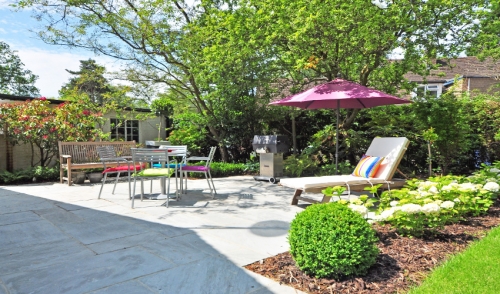
Creating Natural Privacy With These Plants
As cities and suburbs grow ever more crowded, your backyard or garden sanctuary is vital to your privacy and well-being. How can you make your outdoor living space truly private, however, without resorting to harsh fences and artificial barriers? Fortunately, there are many attractive plants that can help you create natural privacy to protect your space.
Defining Your Privacy
Before choosing plants to create a natural wall of privacy, you need to know your own expectations about the type of privacy you would like. Plants can help block light, sound and sights, screening off a small area or a complete backyard. The right privacy landscaping might be used for screening a pool or spa, hiding an unsightly view, shielding a bathroom or bedroom window or even deterring unwanted wildlife. No plants, however, can be as effective at creating total privacy as a solid wall or enclosed building, and it is important to understand what to expect from privacy landscaping.
Best Plants for Privacy
There are many types of plants that can be used to create a sense of privacy. Depending on your needs, consider…
- Evergreen Trees and Shrubs
These plants maintain their thick foliage year-round, making them ideal for continual privacy. Opting for plants with branches that drape to the ground will create the thickest barrier, and plants should be spaced so their tips will just overlap at their mature size to be sure there are no gaps. Popular evergreen trees and shrubs for privacy include different varieties of cedar, pine, spruce and holly, as well as broadleaf tropical plants such as palmettos.
- Hedges
Hedges are economical, efficient choices for creating outdoor privacy, as their upright, generally columnar shapes can become natural fences. Shrubs generally require more pruning to maintain their shape, but their density is ideal for privacy. Top types of shrubs for privacy landscaping include privet, hawthorn, arborvitae and boxwood, and for thicker, wider shrubs, lilac and forsythia can add a pop of color as well as dense screening.
- Vines
Thick, climbing vines create a living wall ideal for a private space. Some vines will cling to trellises, wires or arbors, while others can creep up walls and fences to screen unsightly structures with lush greenery. Both types, however, will require some training and pruning to be sure they don't overtake an area. Creepers, climbing roses, climbing hydrangea, ivy and clematis are popular options for privacy vines.
- Bamboo
Bamboo is an exotic, eye-catching option for privacy landscaping, and its fast growth allows for quick installation and good results when privacy is paramount. Different types of bamboo can be invasive and difficult to control, however, so it is important to opt for clumping or hedge varieties to help this plant create privacy rather than problems. Using large troughs or other containers for bamboo is also an option.
- Ornamental Grasses
Taller ornamental grasses can create a dense privacy screen with a soft, lush texture. These plants are ideal for late summer and autumn privacy, as that is when they achieve their fullest, densest growth. Opt for taller varieties of feather reed grasses or bluestem grasses to create a privacy barrier, or use smaller or mid-sized ornamental grasses to fill in gaps in border landscaping to thicken an existing barrier.
- Cacti
In the right arid climate with well-drained soil, cacti can be a unique option to create privacy, and their thorny texture will quickly deter any unwanted intruders. Most cacti are slow-growing but long-lived, and different upright varieties can create interesting fence-like structures, though they may lack some visual density. Top cacti for privacy include candelabra, organ pipe, silver torch and Mexican fence post cacti.
Tips for Privacy Plants
No matter what plants you choose, it is important to take steps to be sure they will thrive in your landscape or you may not get the privacy you hoped to create.
- Avoid invasive plants that may take over your landscape and crowd out other desirable plants, or take very deliberate, careful steps to control them right from the beginning. Pruning, trimming and shaping will be essential.
- Opt for plants that will mature to the size and density you desire, rather than simply choosing the fastest-growing plants available. Always consider the final look of the mature plants when planning any type of landscaping project.
- Choose the best privacy plants for your soil type, sun exposure, moisture levels and soil quality to ensure the plants will grow well and stay healthy. Water and fertilize them appropriately and keep an eye out for any pest problems.
- Consider using containers to grow privacy plants like vines, bamboo or grasses. Containers can be moved around your yard to adjust your privacy screen, giving you more options for how to arrange plants as your privacy needs may change.
Plants can be the ideal solution to any outdoor privacy problem, and if you opt for the right plants and arrange them in the right way, your yard or garden can be nearly as secluded as any room in your home.
